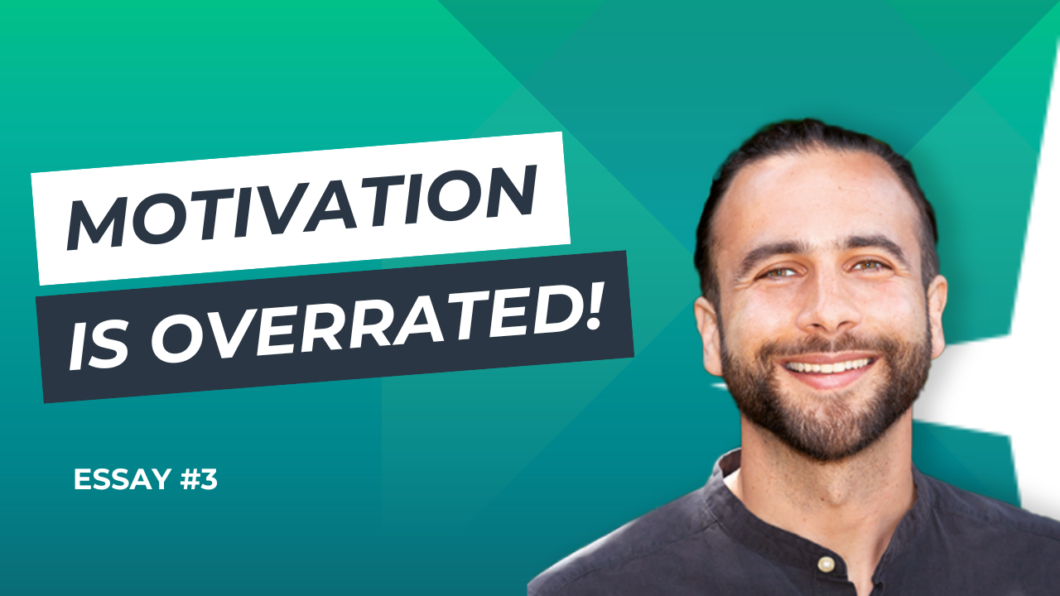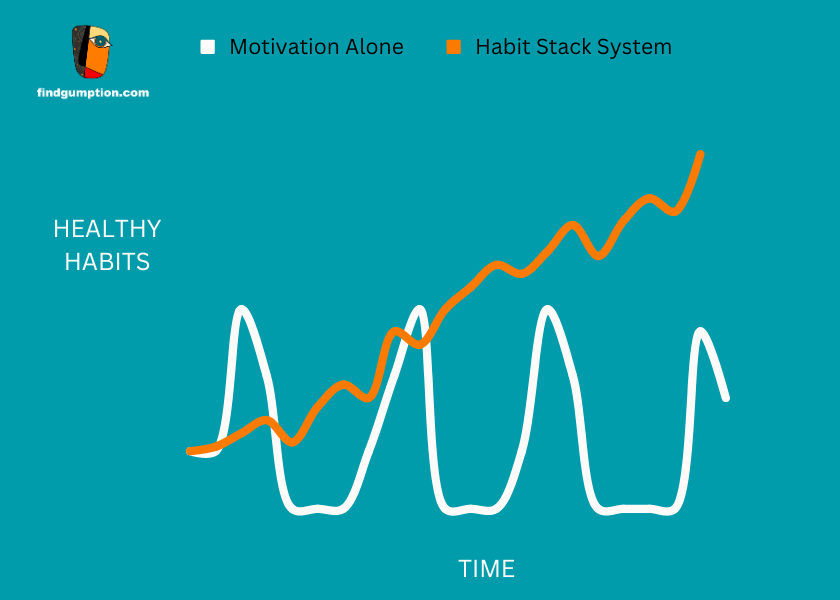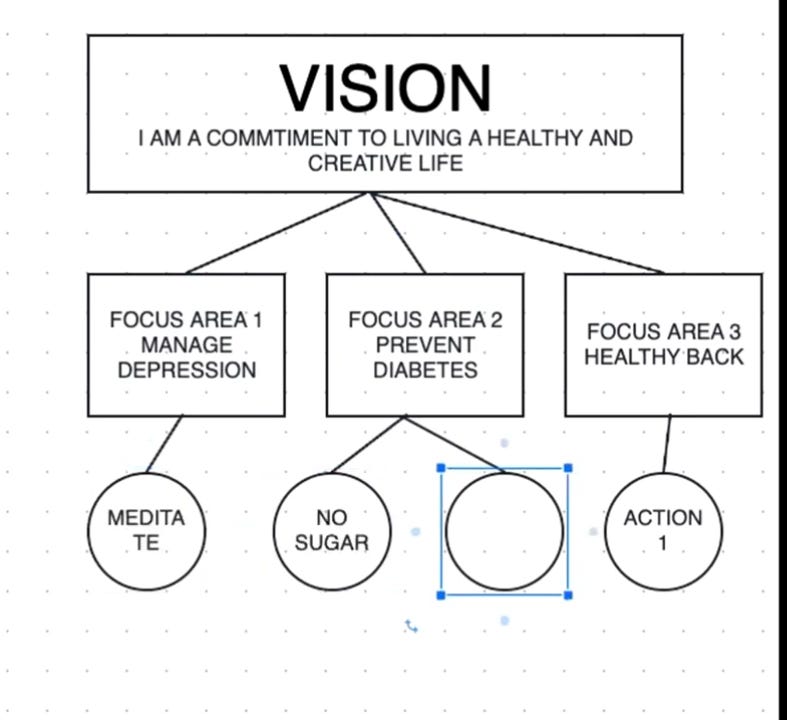Sick of the “rise and grind” mentality? So am I! It’s time to rethink motivation. This video reveals the importance of endurance in achieving lasting change. Watch now to learn how to break free from the cycle of motivation highs and lows.
“Enthusiasm is common. Endurance is rare.”
―Angela Duckworth, Grit: The Power of Passion and Perseverance
Motivation is very much like happiness.
It is an emotion that comes and goes.
Do you only work when you are happy? No!
Sometimes, we work even harder when we are sad.
Why do we believe that being healthy is possible only when we are motivated?
Today I will help you build a simple system for habits that will give you long-term gains far beyond what motivation alone can offer.
Never miss the gumption. Ever!
Why do we keep losing steam with healthy habits?
When I realized I was not a healthy person in medical school, I started trying to change that around.
I leveraged my strongest muscles: knowledge and sheer willpower.
It worked for a bit – I ran, lifted, ate healthy and quit smoking.
That made me feel superb.
Then the inevitable would happen. I
miss a workout, or
smoke a cigarette, or
go into a binge eating session, or
party a little too much
and my drive for a healthier life gets destroyed!
“I have failed myself once again.” I would say.
“I am not really a healthy person.” I told myself.
“I will never be like those people who go out running.” I told my friends.
Farewell, healthy self. ‘Tis been real, amigo. See you on the next new year’s resolution.
Does this sound familiar?
My Aha Moment
The pattern I described above continued well into my data consulting career and early thirties. It was only when I got interested in lifestyle functional medicine and joined the coaching academy did I realize what was blocking me.
In one of my health coaching sessions, the facilitator asked me this: Who would you be if you are healthy? What would that person look like and feel like?
I realized in that moment that I have been approaching my health using the “Rise and Grind” culture that society rewarded me for.
All along, I had been using the same approach I use for work: Set a goal and grind to achieve it. The result would be binary in my head: I either won or lost.
This is the same problem that I see with most of the hyper-ambitious people who I coach: They approach their health from an all-or-none state.
Run a marathon or go for months without exercise.
Long meditation retreats or extreme mindlessness.
Go on a strict keto diet, build massive muscle and lose weight, followed by months of eating crap and gaining more weight than they lost.
What is it that we are missing?
Welcome to Dopamine – your best friend and your worst enemy
Our motivation is driven by a very moody and shifty beast of a chemical called dopamine.
It gets us off our asses and into the gym, makes us climb mountains, chase new clients, pursue partners, look for gold, run marathons, and start writing books.
However, to understand dopamine, you need to think of it as a very moody friend.
It goes up when you are pursuing a goal and then comes down crashing after that.
You’ve heard of unconditional love, right? Well, dopamine is the chemical of conditional love.
It always wants you to do more.
If you ran a few miles, it wants you to run a marathon.
If you started adding some vegetables, it wants you to lose 25% of your body fat.
If you started biking, it wants you to ride up and down the Yosemite valley.
You may think that this is great, but it is only great for a brief time.
Think of it this way: you only get one cup of dopamine every morning.
You need this cup to cover every single decision you make that day, and every single action that is novel and requires your motivation. That includes:
Your health
Your work
Your family
What you’ll eat
What you’ll wear
Everything else
Motivation alone cannot sustain habits without a system in place that relies on more than just dopamine.
Dopamine is a dictator. Its purpose is not fun and joy, but survival and achievement.
Society leverages all of our dopamine for work and economic prosperity. The little that is left is supposed to be enough for health, creativity, fun and family.
So we use up some dopamine to join the gym, start running, sign up for class, and so on. That works at first, but then once these activities become repetitive, dopamine moves its attention elsewhere.
Dopamine thrives on variety and novelty. Something your work will usually offer you daily, but consistent health habits do not do so after a while.
We stop caring about our long-term health unless it’s tied to a big, flashy goal that boosts our ego.
So the next time you call yourself “lazy and fat” know you are neither that, nor are you calling yourself that.
This is your dopamine feeling low and blaming you for how it is feeling.
Your true self does not rely on dopamine alone.
Your true self is neither an overachieving healthy beast nor a couch potato.
Your true self is what you need for long-term, consistent health gains.
Motivation is limited. Your Identity is not.
The last two essays should have helped you create a healthy vision and explore your inner dialogue on traumas and health.
If so, then you are ready for the next phase, which is building a new identity.
Motivation and dopamine are great for starting things, but as I explained above, not for sustaining them.
There are other chemicals for that such as endorphins, serotonin and oxytocin that become engaged when you reinforce your identity.
Using your vision, start thinking of your future healthy self.
What does future you care about? How would s/he invest their time and energy?
Think of your habits as a portfolio of investments.
Dopamine and motivation alone are like putting half of your life savings in a shiny new cryptocurrency that is volatile. Fun investment, nice to talk about, but not likely to make you rich.
To maintain good health, you need to make small and consistent investments that are safe and will pay off in 10-20 years. At some point, they become boring and repetitive.
Dopamine does not like that, but your sense of identity THRIVES on that.
This is how I have transformed my health AND that is also how I wrote a novel.
I do my health routines every day, and I write every day.
While that may look dull for someone witnessing me on the outside, it brings me extreme contentment.
I deeply aligned my routines with who I am.
I stopped saying “I will write a book”
and started saying, “I am a writer.”
It took some time (and motivation) to get there, but after a certain point, it became ingrained in me. It does not require much thought or energy anymore.
That is the whole idea of the sensational book Atomic Habits: Improve 1% every day and you will become a habit-millionaire.
The only way you can do that is by creating a new identity.
Words create worlds
Stop saying “I will start exercising.”
Start saying, “I am a person who exercises.”
Stop saying “I will go on a diet.”
Start saying, “I am a person who loves healthy whole foods.”
and so on…
This is how I turned from someone with a lot of terrible habits to someone who has a solid routine.
By investing in your new identity, you will be ready to build habits that make sense to you, and that you can build for the long term regardless of your motivation.
This identity is your bank account, and every small positive habit you make is an investment in that new healthy identity and transformation.
Pick the right actions for you
There are six areas that you need to think about and start addressing, based on your own unique vision.
You can’t just work on all six simultaneously, however, so you need to figure out which ones you want to start with.
I will cover each of those over the coming weeks and months, but details are not important right now.
Remember the vision template I shared with you two weeks ago?
We are in the Actions you have identified that are aligned with your vision and key focus areas.
What does this person, who you are creating, do daily to be healthy?
Examples could be:
Eats a lot of protein in the morning
Does a 15 min HIIT exercise everyday
Connects with friends.
Avoids porn/weed/cigarettes addictions
Sleeps for seven hours every night.
Once you work on one of these, you will start seeing benefits in the others so it does not really matter where you start. See what makes sense to you for the most gains.
Some examples of how these areas cross pollinate are:
Being sleep deprived ➡️ makes you crave more sugar and carbs.
Exercising regularly helps you ➡️ manage stress better.
Having healthier relationships can help you ➡️ get over addictive patterns (and vice versa)
We’ll get more into these nuances later.
Identify your top 1-2 actions for a healthier you and fortify your life to follow through.
Here’s a way to help you build and keep the gumption to do so 👇
The 3 S Habit System: Simplify the action. Streak your wins. Soothe your losses.
Here is a way that is guaranteed (and I never use that world lightly!) to help you build long term sustainable habits.
I tried and tested this with many clients and it is the system that I used to build my own habits, so I really know my shit when I tell you that this is possible. I’ve seen it in action. It works for almost everyone.
I created this based on the science from books like Unwinding Anxiety, Thinking fast and slow, Atomic Habits, Nudge, and A Well-Designed Life. (See notes below for links and further reading)
STEP 1: Simplify It
The basic way of getting into any habit is to simplify it.
Make it so obvious that you have no option but to do it.
Let gravity do the work for you.
“First, never underestimate the power of inertia. Second, that power can be harnessed.” ― Richard H. Thaler, Nudge: Improving Decisions About Health, Wealth, and Happiness
Your eyes are literally part of your brain and nervous system. When we see things, we are likely to engage with them, and vice versa.
“Out of sight, out of mind” applies not only to people but to habits as well.
So…
Want to read more? Put a book where you drink your coffee.
Want to do more yoga? Open a mat so that it is ready and inviting when you wake up.
And the opposite is true.
The author of a well-designed life lost weight by hiding the cookies in a jar away from her eyes.
I quit smoking by removing all cues for it from my home, and the same thing for sugar. I keep it out of my kitchen and it makes it super hard for me to have it.
I need to spend energy to get it, so I am less likely to do so.
We are monkeys, just accept it.
TRY IT: Build Your First Habit
If you do not have a morning routine at all, here is how to start:
Get a bottle of water and fill it up at night.
Put it right next to your bed where you can see it.
Drink it first thing in the morning (before you look into your phone!)
Congratulations! You have habit #1.
This serves as your foundation.
STEP 2: Streak It!
It is baffling how much we love the idea of a streak. It is so satisfying for us.
Habits feel good at first because of dopamine, but to keep going, you need to show your brain achievement.
Seeing your habit streak can give your brain a sense of achievement and relaxation, even if the habits are repetitive. This will keep dopamine happy and on your side.
What you are actually doing is collecting votes for your new health identity. You are investing a dollar a day into the retirement fund that is your body.
Soon, the streak will not matter anymore, neither will the amount of motivation you have. You will become what you do.
A streak is the most surefire way to get the dopamine to support you long enough to get there.
Seinfeld used it to become a comedian.
I used it to become a writer.
Sports use it to keep us hooked on watching.
You can use it to sustain your habits.
Try It: Create a visual streak for your water habit.
Now that you are drinking water in the morning, print a physical calendar or download any habit app to track your water drinking. (The one I use is called habit share and you can add me [email protected].)
Every day you drink water, cross it off and see your streak grow.
See how many days you can do it consecutively and enjoy the sense of confidence you get from this.
Enjoy the dopamine surge while it lasts.
STEP 3: Soothe It!
You will inevitably fail at your habit because you are human. What you do next will determine your long-term success.
Shame festers in the dark.
The reason people never lose weight is that when they break their diet, they shame themselves, and ironically, the way they deal with shame is to eat more food.
This is the whole point of this article: When you miss out on a habit because of low dopamine, remind yourself that it is ok. The bad feeling is just your dopamine crashing.
What happens next determines your success, big time!
Try It! Self soothe when you miss a habit
When you miss drinking water one day, and you break the streak, take a moment to notice what you are telling yourself.
Take any self-shame and turn it into self-kindness. Would you beat a friend up for missing their healthy habit? Tell yourself what you would tell a friend.
Remind yourself that we all break habits. We all get lazy. We all fuck up. This is not a “You problem”.
Get back on your feet the next day – THIS IS CRUCIAL. Sooth yourself just enough to get back into your habit the next day.
Missing one day is ok, missing two is not. Miss three and it is no longer a habit.
I hope you could change your mind today with me and start forging this new identity that is healthy and grounded.
Next week, I’ll talk about the last part of the gumption method: measuring progress with data and biomarkers.
Stay tuned for next Sunday,
Join the waitlist for my coaching programs.
If you value this content, help me make more by supporting the channel and sharing the gumption with a friend of yours at the same time.
Key takeaways:
Motivation is overrated. It is good to start things but not to sustain them.
Identity is critical for healthy habits – start investing in your future self by identifying the right actions.
Make habits simple and use your environment for long term success.
Celebrate the streaks and soothe yourself when you miss one.
Allow yourself to miss one time but not twice in a row, especially when developing a new habit.
Further Reading:
Atomic Habits
A Well Designed Life
Nudge
Unwinding Anxiety
Future You by Benjamin Hardy
Andrew Huberman on Dopamine and Procrastination
Self Compassion





